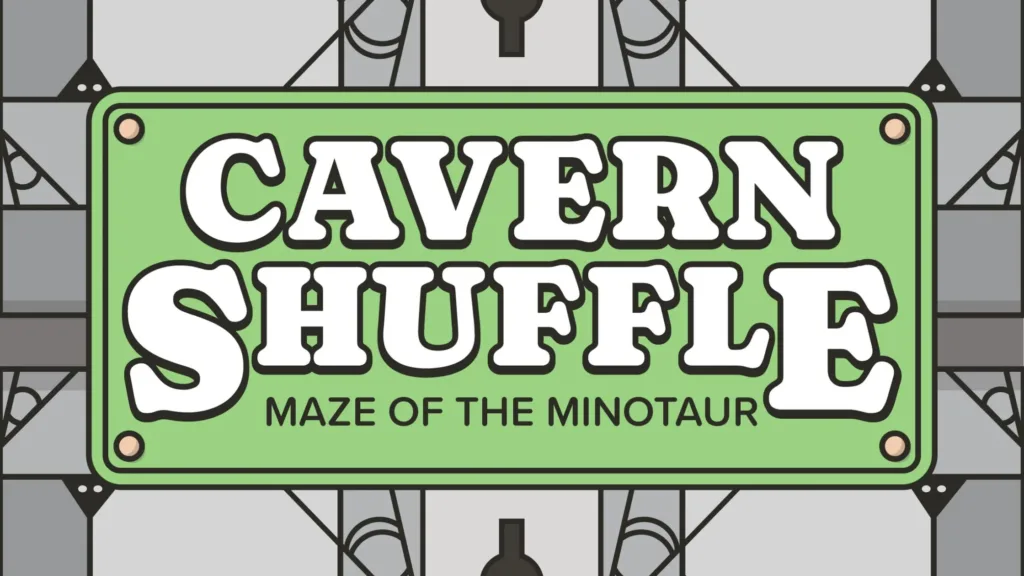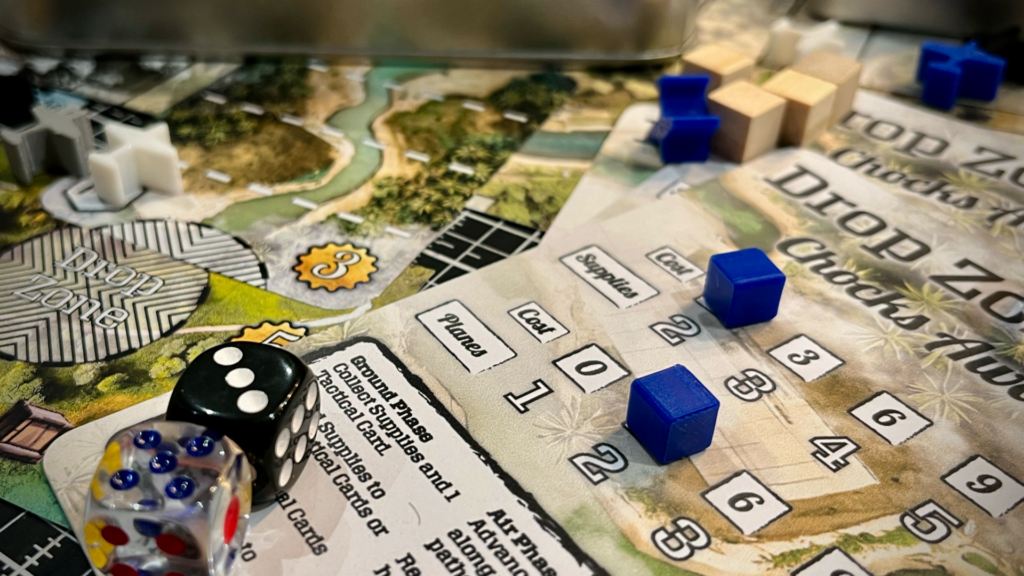Welcome to another edition of the What If blog, where we explore the minds behind the games we love. Today I’m chatting with Ryan, the creative force behind Gravy Boat Games. We’ll dive into Ryan’s journey from advertising professional to indie board game designer, how pandemic redundancy led to pursuing his dream, and the fascinating rise of solo gaming that’s reshaping tabletop experiences.
Ryan’s story is one of passion and finding opportunity in unexpected circumstances. Having backed and played his latest game, Cavern Shuffle: Maze of the Minotaur, I’m excited to explore the creative process behind this clever solitaire-inspired dungeon crawler.
So grab a cuppa, fine a quiet space and join us as we navigate the caverns of indie board game design.
Joe: Welcome to the What If blog! Can you start with a short introduction, who are you and what brings you to the world of board games design?
Ryan : Hey Joe! Thanks for having me. My name is Ryan D, I am the owner of Gravy Boat Games based in Vancouver, BC. I am a solo publisher of two games: Gather Your Party and Cavern Shuffle: Maze of the Minotaur. When I am not working on board games, I am a freelance art director and graphic designer.
Great question! What brought me into the world of board game design started over late nights around my living room coffee table in university. Many drinks, laughter, and enemies were made those nights. What also formed was a profound admiration for board games and how it connected players on a deeper level. How one game had the ability to roll into the next and invited new ways of play, every time you played – the “table narrative” of it all.
Obviously making games didn’t happen overnight, I slugged out many years working in advertising, always saying one day I will have time. Well 2020 happened, the world took a turn, I lost my job, and suddenly I had time. I picked up Gather Your Party off the shelf in the back of my mind and thought I would give it a shot. Leveraging my skills as a designer, storyteller, and marketer, I knew this is what I wanted to do. Fast forward to 2024, taking all the learnings from Gather Your Party empowered me to continue to share my admiration for board games with my second game Cavern Shuffle. And now I’m here, having a conversation with you!
Joe: That’s an interesting journey. It feels like you were always destined to make a game.
On the What If? Blog I like to explore games design, but also to understand what it’s like being a designer. I wonder if you could tell us a little more about making “the jump” after losing your job. Many of us are curious about making games design our day job, what was that like?
Ryan: Ha, well safe to say I still have a day job, though, two are slowly becoming one as time passes. But dialling it back, the proverbial jump was not overnight, I first had to make sure the idea worked first. In that time I shifted to a freelance designer, finding clients, reconnecting with old clients, I began working for myself. I became my own direction.
I knew Gather Your Party was always something I wanted to make, so I took the leap of designing a first prototype.
I knew Gather Your Party was always something I wanted to make, so I took the leap of designing a first prototype. It wasn’t the nicest looking thing, but it became the foundation for iterations to come. Remember this all happened in the pandemic when everyone suddenly had time. I had family, friends, friends of friends who became my playtesters. Iterating, listening, reiterating it was exciting, and thought provoking.
When I was developing Gather Your Party ,I tried to be realistic. I didn’t want to make a super convoluted game that would need years of testing. I wanted to make a game that was turnkey, that was easy to understand, and was smart with the design decisions it made. I wanted to also understand if I liked making games. After a year of testing, designing, freelancing, and saving up; the game was finally ready for Kickstarter.
But to answer your question, what was it like? It was tough, but incredibly rewarding. You also start to realise that 20% of starting your own company is actually spent doing that thing. There is so much you don’t account for: marketing, sales, emails, production, shipping, more emails; every day you are going to learn something new and if you have the patience and confidence to keep going, you’ll find players that like your ideas.
Joe: I’m glad that toughness is outweighed by the rewarding parts!
One thing I’m always super interested in is ideas and where they come from. I backed Cavern Shuffle and have now played it many times. Clearly there’s a strong foundation to the game from Solitaire (or whatever you call it), but I wonder if you can explore where the rest of the ideas came from?
Ryan: Of course Joe! I think a lot of my ideas come from the stories that manifest in my mind when I play a game. That the way mechanics play out on a table can transcend what’s written on the card. When you play a game like Seven Wonders, you aren’t just collecting sets, you are BUILDING an empire. In Cavern Shuffle, you aren’t just playing Solitaire, you’re navigating a dungeon with your four adventurers and taking on the different encounters until you are strong enough to take down the Minotaur. The narrative is what compels me to bring ideas to life.
The narrative is what compels me to bring ideas to life.
Practically speaking, I do think observation and circumstance also play a lot into it. Once I figure out the narrative, what styles of games are players moving towards? What styles of games do I want to make? Do you have a playgroup that is open to play your games? Cavern Shuffle for instance, came after I had just moved to a new city, and it was easy to playtest by myself, it didn’t hurt that solo games were also on the rise!
Joe: I’m with you here, it’s the narrative that drives so much of my games design too. Trying to piece the mechanics together that really drive a theme home is the part I love the most.
You mention the rise of solo games, and games that have solo modes. Can you explore a bit about where that rise has come from in your opinion?
Ryan: That’s awesome, there is just so much power in the narrative. With the rise of solo games, obviously it would be easy to say the Pandemic was the straw that tipped the camel’s back, but I think that board games were trending in this direction even before that, whether it’s time, value, and community.
Have you ever tried to get a consistent tabletop group together? I’m always envious of players that can get to the table on a consistent basis, but for a large majority of players it’s just not feasible. Time to schedule a game, time to learn a new game, time to play a game. Solo games give players the opportunity to play and learn on their own time. If something is interesting, you no longer have to wait until your partner is available.
This would be more directed toward games with solo modes, but when you purchase a game you want to be able to play it. Solo modes give players the ability to discover more without having to purchase an expansion or having to get another player to the table. It is definitely a great creative solution, whether or not you find yourself playing the solo mode, it beats the game collecting dust on your shelf.
The rise of solo games beyond PnP games has given players a more rounded experience to the hobby they love.
Culturally, humans are drawn to community, having interests, and letting those interests define who we are. I think naturally, board gamers are always on the lookout for games, the gameplay, the art, and games that they have access to. The rise of solo games beyond PnP games has given players a more rounded experience to the hobby they love, virtually letting you play every day.
Ultimately, it is an exciting time to play games. A new wave of empowered and independent publishers being given a platform to share their crazy ideas, with a community that is here-for-it.
Joe: These are really solid reasons. I see the way and reasons why I play solo reflected in all of them. I also find that beyond those there are some ace solos out there (cough Cavern Shuffle cough) that let you play in new ways.
There’s also something I’d say was almost meditative about solo gaming. It’s a thoughtful exercise that allows escape from the day to day, but in quiet, sometimes peaceful contemplation. I’ve found myself more and more reaching for a game instead of a book recently.
Ryan: I’m probably missing a few reasons for sure, but looking at Cavern Shuffle. I think what makes it so special is the foundation it is coming from. It’s probably one of the first solo games that a lot of players are introduced to, so inherently there is this aspect of nostalgia that comes with it. Developing it for a more modern gamer and giving purpose to a lot of aspects to the existing gameplay felt right. And I think it creates a universal foundation for a lot of players to latch onto.
And you are not alone in this peaceful contemplation. I think more and more players are trying to get off their phones (specifically social media) and find more cerebral ways to unwind. Solo games combined that meditative, contemplative, and tangible feeling that is definitely more fulfilling. I think we are entering a golden age of solo games.
Joe: Thanks Ryan for joining me on the blog this week. To finish off, can you let us in on what you’re working on next and let us know how we can support your work.
Ryan: Thanks so much for having me Joe ! I am currently working on a few new adventurers for Cavern Shuffle, that’ll be up on the BGG page early May as a community playtest PNP. You can follow me on Instagram @gravyboat_games or check out both games on gravyboatgames.com.
It’s been absolutely brilliant having Ryan on the What If blog this week. His journey from advertising professional to board game designer represents what I love most about the indie tabletop community: passion, creativity, and seizing opportunity even in challenging times.
What particularly resonates with me is Ryan’s focus on narrative. The best games aren’t just mechanical exercises but vehicles for stories that emerge organically through play. Cavern Shuffle achieves this brilliantly, transforming a familiar card game into a dungeon-delving adventure that feels fresh with each playthrough.
The rise of solo gaming that Ryan discussed is something I’ve noticed in my own gaming habits. Whether it’s the challenge of scheduling game nights, the meditative quality of playing alone, or simply the joy of engaging with a clever design on your own terms, solo games have become an essential part of the hobby.
Want more blogs like this – straight to your emails – sign up below!



